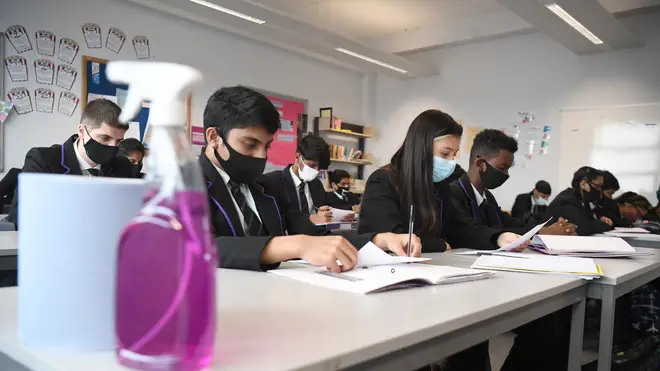
Paul Brand 10am - 12pm
28 June 2021, 16:54

Schools and local authorities in Wales will be able to make their own decisions about coronavirus measures in education settings, under plans announced by the Welsh Government.
Speaking at a press conference, education minister Jeremy Miles said the “extraordinary measures” would be “gradually eased and that schools would be free to make decisions about things such as mask-wearing, testing and self-isolation.
“As we move through the pandemic there will be a need to move to a more localised approach rather than a blanket approach,” said Mr Miles.
“To enable this we will publish a national framework for each education sector which will support them to escalate and de-escalate interventions based on risk… The frameworks will allow escalation or de-escalation of measures such as testing, the use of face coverings and social distancing.
"It will apply to schools, colleges and universities and follows the approach already modelled in care homes.”
He also said: “Our guiding principle has to be a move towards education being enabled to operate as “normally” as possible in the autumn."

Furious parent is fed up with school self-isolation rules
The news comes as the UK Government is falling under increasing pressure to relax coronavirus restrictions in English schools amid concerns of children missing out on more learning because of self-isolation requirements.
Under current rules in English schools, if one student tests positive then entire bubbles – or even year groups – may be sent home to isolate for 10 days.
This is despite some health experts believing children do not play a significant role in transmission of the virus.
Read more: 'Children are being blamed': Calls for change to Covid isolation rules in schools
Read more: Sajid Javid to make statement on remaining Covid restrictions
"What we know is children are not drivers of transmission, I don’t know how many times we want to say that," said Professor Allyson Pollock, Clinical Professor of Public Health at Newcastle University, speaking to LBC's Nick Ferrari on Monday.
"They reflect the community prevalence but they are not key drivers of transmission and they’re being blamed unnecessarily and targeted."
Professor Pollock also said that the Government was "overtesting" by recommending that children take two rapid Covid-19 tests each week.

'The government is over-testing' public health expert says
She said: “One of the biggest problems is that the Government is overtesting at the moment.
"It’s using lateral flow tests, these rapid tests, in children twice weekly, and there’s no evidence at all that these tests, which they’ve been using for over a year now, are stopping transmission."
She added: "You should not be rolling out lateral flow testing and mass testing without having done good evaluations of the costs, the benefits, and the harms, and what we’re seeing is enormous harms with children losing huge amounts of school, not just through the epidemic but now as well."

Primary school headteacher talks about Covid isolation in schools
The latest figures from the Department of Education showed that 2.3 per cent of all state school students were self-isolating because of possible exposure to Covid-19 in school, as of 17 June.
This is up from 0.5 per cent on 10 June.
It translates to about 172,000 students self-isolating because of potential contact with a positive case.
There are concerns that this number could climb even higher as all adults in England over the age of 18 are now eligible to book their vaccine.
Read more: Camera that caught Matt Hancock kissing aide has been disabled
Read more: Primary school boy referred to Prevent programme after teacher mishears 'alms' as 'arms'
The requirement for students to isolate has knock on effects for parents, many of whom may need to either arrange childcare at short notice or take time off work.
There are also worries that, after an already-tumultuous 18 months, being sent home will cause yet more disruption to students’ education.